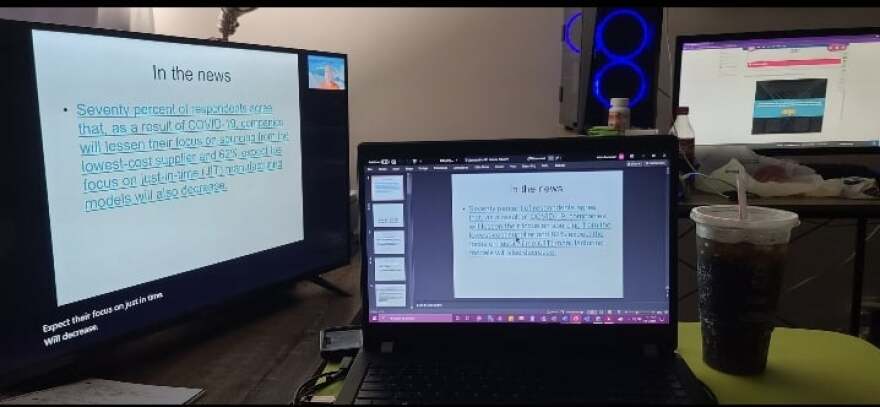Haskell Indian Nations University junior Ashley Carabajal says she’s been learning mostly online since March of 2020, and several weeks into yet another virtual semester, she’s feeling frustrated. She says she wants the university to at least open student resource buildings and give students the option of in-person instruction.
“They're not really telling us anything. They just kind of leave us in the dark about everything,” Carabajal says. “I've noticed it’s making students unhappy because they have no idea what's going on.”

Citing the high level of COVID-19 cases in Douglas County, Haskell University in Lawrence, Kansas, recently decided to continue coursework for the spring semester entirely online. In a statement released Friday, school officials said they will reconvene in early March and decide whether to re-open the campus. All students, faculty and staff are required to be fully vaccinated.
In addition to the delay in in-person instruction, students say they are barred from buildings like the library and activity center, which is making it harder to complete classes and feel connected to Haskell.
Rebecca Villalobos, president of Haskell’s Student Government Association, says she appreciates everything Haskell has done to mitigate the spread of COVID. At the same time, she thinks the university is doing students a disservice by keeping campus shut down.
“I definitely think students are having a bit [of] trouble, especially since the library is closed and Curtis [Hall] is closed,” says Villalobos. “It can impact the mental health of the students, you know, not being able to go to a place where there is a table and a chair to do homework. Not having that access to these facilities can make it harder for students to get engaged in school or to even want to start school, since it’s all online.”
Villalobos says other than fall semester, when the university gave students the option to choose online or in-person classes, Haskell has been on lockdown since the beginning of the pandemic. She says this is especially hard on new students.
Carabajal moved to Lawrence from Alaska. She has a cousin who also attends Haskell, which has around 800 students. He too moved from Alaska to study at Haskell, where he is a freshman who lives in a dorm.
“I don't know if he's really liking it,” Carabajal says. “They didn't give him a roommate, so he is in there by himself mostly and his classes are all online.”
Carabajal says she recently tried to check in with her cousin at his dorm. She says she was wearing a mask, but a resident adviser gave her and her cousin a write-up and didn’t explain what the write-up was for.
Justin Tso, a senior, feels that Haskell is not listening to students. He says students are mature enough to make good decisions if the college lifted some restrictions.
“I appreciate the campus taking so much precaution and so [many] protocols and keeping us safe, but at the same time, you know, like we’re all young adults,” Tso says. “We can make our own decisions, and I know the majority of the students would really appreciate it and would just boost up morale if the campus was open.”
Tso says he used to be on campus all the time before the pandemic. Now it feels like a ghost town.
“Right now it just feels like campus is dead. Like there's no life,” Tso says. “There's nothing. There’s nothing open. It feels like there’s no reason to be on campus at this point.”
Not all students are ready to return to in-person instruction. Alicia Swimmer, a senior, says she wants to keep learning remotely to keep her 11-year-old son, elderly mother and the community safe.
“I haven't been comfortable going on campus, because our student body, they’re not really responsible and I can’t really tell them what to do because they’re adults,” Swimmer says. “But it's like, they take on the mentality of, you know, they’re young and they think they can conquer the world. But it’s almost like they're not really thinking of the staff and faculty.”
Swimmer adds: “We have some really special faculty members that are elderly people and I would hate for them to get sick just because somebody wants to have class in-person and they're not exercising like a healthy lifestyle outside of class hours.”

Swimmer says she thinks large buildings on campus, like the library, should be open with strict mask-wearing and social distancing policies if Haskell returns to in-person classes in March. She would also like to have the option to continue to work remotely.
Swimmer plans to graduate this spring. Last fall semester, Haskell’s ceremony was remote. Swimmer says the Student Government Association held its own, socially distanced and masked ceremony to give graduates the opportunity to walk.
If COVID case rates in Douglas County go down by May, Swimmer hopes Haskell holds an outdoor ceremony. In the statement, Haskell said a decision about in-person or virtual commencement was “forthcoming.”
Tso plans to graduate this fall.
“I wanna be able to walk across the stage, holding my diploma,” he says. “It’s just another feeling, you know, like, it’s better. It feels more rewarding walking across the stage in front of families and friends and holding the diploma.”





